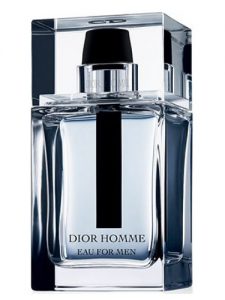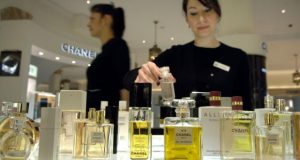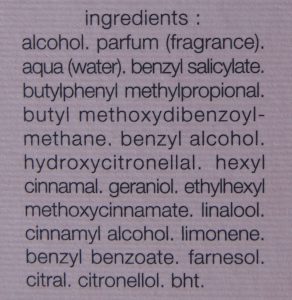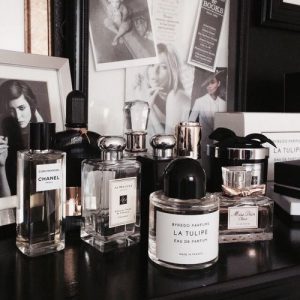Perfume reformulations? Yes it’s a thing and it’s been going on left and right for a very long time. Have you ever purchased a bottle of one of your favorite perfumes only to discover that it smells completely different than you remembered? Your mind goes anywhere from suspicion (Is it a knock-off???) to disappointment (This doesn’t smell nearly as amazing as I thought it did!) to confusion (Is it me or it it the perfume?!?) If you’ve never heard of perfume reformulations, this is a common practice in the perfume industry and occurs for a variety of reasons.
Sure, it might be a knock-off or was possibly spoiled from improper storage, but it’s even more likely that what you are smelling is a perfume that’s been reformulated. Unless you are smelling a perfume less than 5 years old since it was first introduced, the odds are that there have been one or more reformulations of that scent.
Why do perfume reformulations happen? I’m glad you asked! There are actually many reasons. Sometimes companies substitute different materials as a way to save money. Sometimes the natural ingredients are no longer widely available or may have become difficult to obtain. Sometimes perfumes are reformulated to “what the market wants” thus bringing them more in line with current preferences in fragrance.
The International Fragrance Association (IFRA) regulates materials used in making perfume and can force companies to reformulate their products if they happen to contain certain ingredients. IFRA’s list of banned substances is long and is constantly growing. Many of them are natural animal-derived notes that have been replaced with synthetic ingredients. If it so happens that the banned ingredient is what gave the fragrance its unique disposition, it’s especially unfortunate.
materials used in making perfume and can force companies to reformulate their products if they happen to contain certain ingredients. IFRA’s list of banned substances is long and is constantly growing. Many of them are natural animal-derived notes that have been replaced with synthetic ingredients. If it so happens that the banned ingredient is what gave the fragrance its unique disposition, it’s especially unfortunate.
When the perfume has been commercially successful, it’s easy to see why perfume companies don’t want to ditch the name or let the cat out of the bag that it’s been reformulated. They often try to use ingredients that will simulate the old smell, sometimes more successfully than others.
Even if the ingredients used haven’t changed, perfumes that rely on natural materials will have some variation from year to year anyways. A crop of lavender from one year
might smell quite different from another year. The scent will also vary depending on what part of the world it is grown in. A lavender grown in Provence, France will not smell like one grown in Kent, UK.
So is fragrance reformulation a bad thing? Not necessarily. You may find some reformulations to be an improvement on the original and sometimes it’s really hard to tell the difference.
Chanel No. 5, which has been around for almost 100 years  (96 to be exact) was reformulated to comply with regulations restricting the use of oakmoss but also made changes to appeal to younger customer preferences. Although it continues as a top-seller, very few of us have actually smelled the original No.5.
(96 to be exact) was reformulated to comply with regulations restricting the use of oakmoss but also made changes to appeal to younger customer preferences. Although it continues as a top-seller, very few of us have actually smelled the original No.5.
Another popular perfume, Dior Homme, first came out in 2005 and contained a heavy powdery iris note which was practically unheard of in masculine fragrances. Many guys loved it but some hated it because they felt it was too feminine. Lo and behold, six years later Dior allegedly reformulated the fragrance to contain a more subdued iris note. Those who adored the original scent were up in arms about it but some preferred the newer version.
loved it but some hated it because they felt it was too feminine. Lo and behold, six years later Dior allegedly reformulated the fragrance to contain a more subdued iris note. Those who adored the original scent were up in arms about it but some preferred the newer version.
And don’t get me started about Opium, which is a shadow of its former self after it was reformulated in 2009. I love how sales associates insist that it is the same formulation and only the packaging was altered. From what I’ve read it had to be reformulated due to IFRA restrictions on spicy ingredients (eugenol and iso-eugenol) which were key ingredients in the 1977 original Opium.
Of course no one wants to know that their favorite perfume has been reformulated, which is why reformulations are kept under wraps. If you ask a sales associate if a perfume has been reformulated  they’ll look at you as if you are crazy to ask such a thing, even though it is painfully clear to you that it’s not the same at all.
they’ll look at you as if you are crazy to ask such a thing, even though it is painfully clear to you that it’s not the same at all.
So how are companies able to get away with this deception? A big part of the answer is that there is no requirement for perfume companies to reveal the ingredients of their  products. They are only required to label materials that are “known allergens” on the product’s packaging, not the full list of materials used. Without the requirement for transparency, companies are able to secretly alter their formulas without any repercussions. Secrecy has been the norm and the mystique for the industry since modern perfumery’s inception.
products. They are only required to label materials that are “known allergens” on the product’s packaging, not the full list of materials used. Without the requirement for transparency, companies are able to secretly alter their formulas without any repercussions. Secrecy has been the norm and the mystique for the industry since modern perfumery’s inception.
Whether or not reformulations are a big deal all depends on how you view perfume. If you consider perfume as merely another beauty product, such as moisturizing cream or body lotion, chances are that you won’t be too bothered with the whole idea of reformulations. If, however, you view perfume as art you would be very bothered. Passing off a counterfeit painting as an original is a punishable offense.
I stand somewhere in the middle on this. I really wish perfume companies would be more open and honest about their practices and the labeling of their products. I am also a realist and I don’t think that’s likely to occur unless companies were required to provide full disclosure.
It’s really important when reading a perfume review,  including those here, to consider when it was written. The review may have been written about a fragrance which isn’t the same one as the one being currently sold in stores under the same name.
including those here, to consider when it was written. The review may have been written about a fragrance which isn’t the same one as the one being currently sold in stores under the same name.
I’ll end this with some advice I’ve learned along the way. With any buying decision, including fragrance, trust your instincts. Don’t fixate on whether or not it’s one of the many perfume reformulations. Just ask yourself if it is a scent you love on yourself. If the answer is yes, then it’s the right perfume for you.
Until the next time,



Very interesting article. Although i haven’t worn perfume in many years, the ones I used to wear evokes great memories in my mind. It would be a shame to smell them now and realize they smell different. I understand why the companies reformulate, and in some cases it’s probably a good thing if the ingredients are not sustainable or harmful. However, I think there should be some discussion about it before you go spend your hard earned money to get what you thought you were getting. I’m into Aromatherapy–is there a list of the banned substances just for my own curiosity?
Hi Lisa,
I love aromatherapy and have written about it on my blog but I don’t know the regulations for essential oils, which is what I’m assuming you use. You should definitely look into it if you want to ever create your own blend. If you’re only interested in selling already approved products then no worries.
Cheers,
Erica
You know, I have bought my favorite perfume only to find out that it did not smell like the previous bottle of it. I never knew that they can reformulate it, and have it smell completely different. I never really thought about it being a knock off, as I buy directly from the source, but this is good information to know! I had to change brands because of the change in smell of my last one. I will check the scent from now on!
Hi there Matt’s Mom,
Sometimes when a perfume has been reformulated the difference is very subtle you may not even notice the change. Other times it’s painfully obvious. Smelling before buying is always a good idea.
Cheers,
Erica
Good read 100% agree on what you’ve pointed out in this article…I particularly like what you said about not to fixate on whether or not a perfume is reformulated and just trust your nose.
Don’t dwell on something that we absolutely don’t have any control of, just change to a different perfume…if it’s not what it used to be…then choose another scent that will fit you.
Hi Gerry,
I get it how some people can’t get past their beloved perfume being reformulated or discontinued but there are still so many great ones out there. I think it comes down to being emotionally attached and I’ve certainly been guilty of that:)
Thanks for your thoughts.
Erica